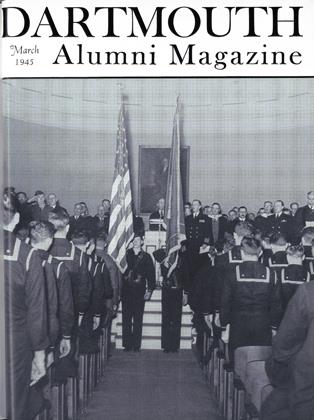CAPTAIN CUMMINGS; CAPTAIN MADEIRA, PRESIDENT HOPKINS, MEMBERS OF THE V-12 UNIT:
For those of us of the graduating class this exercise brings to a close sixteen months spent in concentrated study preparing ourselves to become better members of the Naval Service.
Most of us entered the V-12 program directly from high schools and colleges throughout the country. Others had their taste of service in the fleet. The transition from ordinary civilian life to college is an experience in itself. Most of us were faced with the challenge of adapting ourselves not only to college life, but to a college life modified by military requirements. It was reveille at 0600, calisthenics, chow lines, drill. At first all of these claimed our attention, but now after a few terms they fade into the background.
Advanced mathematics, English, history, physics, chemistry, navigation and other military subjects were on our schedules. We undertook them at first with a rather vague realization of their bearing on our future needs in the Naval Service. Now, we see more clearly the need of studying subjects which provide a background of knowledge. As time passed we began to gain an insight into the aims and purposes of the V-12 program.
While at Dartmouth we have learned a great deal, intellectually, culturally, and personally. We have made new friends, closer companionships and many close associates. Baker Library, College Hall, Dartmouth Hall, The Nugget, are but a few of the places which will hold memories for all of us. We entered athletics and other campus organizations and will take with us the memories of the times we have had together. The campus organizations have given us a chance to find relaxation" and pleasure. From these outside contacts together with our academic work it is possible that we have achieved a new sense of values, a truer perspective of life.
Although the V-12 program is a military organization the main emphasis has been placed on education. We have often WOE dered why this was true. Now the reason is clearer. The Navy needs not only technically trained men, but men who in addition to their technical knowledge have a broad education which gives them educational maturity—an educational maturity which enables them to apply their technical knowledge with a flexibility required by modern naval warfare. From this opportunity we are not only getting the basic qualities of a Naval officer but the qualities which make for success in any field. These qualities will be of value whether we remain in the Navy, return to college, or make the transition to civilian life.
The time now comes for us to take leave of Dartmouth—to continue our studies which we hope will eventually lead to commissions in the Naval Service. We look to what lies ahead with great expectation. Yet we leave with a feeling of regret for we cannot help feeling that after our stay here we are part of the College and we will as Dartmouth Navy Alumni carry with us the spirit which is Dartmouth's.
Speaking in behalf of the Navy traineesmay I express to Dartmouth College, to the faculty, to the officers of the V-ia Unit, and to the people of Hanover, our sincere appreciation for all that they have done in preparing us for the duties which lie ahead.
ALL HANDS ASSEMBLE FOR V-12 CONVOCATION. A genera! view, supplementing the close-up forming this month's cover, of the gathering which marked the close of the training program for 178 apprentice seamen and 45 Marine Corps privates. On the platform are President Hopkins, Captain Cummings, com- manding officer of the Unit, the speaker of the occasion, Capt. D. L. Madeira, director of training, Bureau of Naval Personnel, the College faculty in academic dress, Ship's Officers and Ship's Company.
 View Full Issue
View Full Issue
More From This Issue
-
 Article
ArticleSCHOOL FOR CRAFTSMEN
March 1945 By C. E. W. -
 Class Notes
Class Notes1929
March 1945 By F. WILLIAM ANDRES, T. TRUXTON BRITTAN JR. -
 Article
ArticleLaureled Sons of Dartmouth
March 1945 -
 Class Notes
Class Notes1918
March 1945 By ERNEST H. EARLEY, DONALD L. BARR -
 Article
Article'Round the Girdled Earth
March 1945 By H. F. W. -
 Class Notes
Class Notes1919
March 1945 By J. KENNETH HUNTINGTON, MAX A. NORTON








